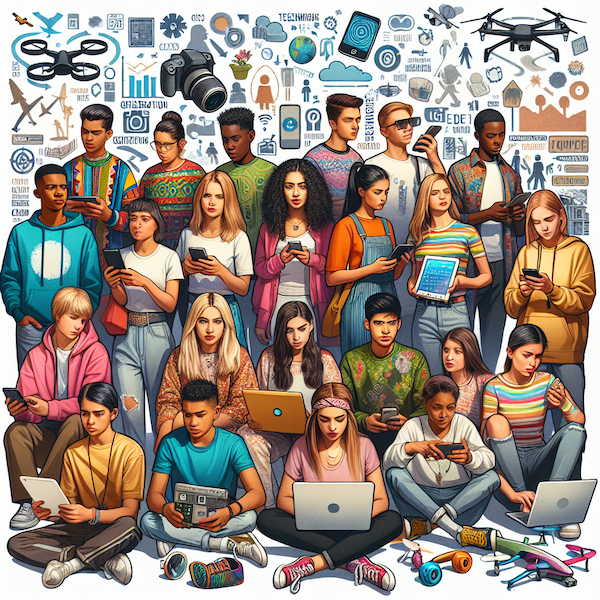Generation Z: Embracing Change in a Digital Age


Key Takeaways:
- Generation Z, born between 1997 and 2012, embodies digital nativism, social consciousness, and entrepreneurial spirit, shaping a world defined by rapid technological advancements and cultural shifts.
- Their cultural impact spans digital media, sustainability advocacy, and diversity awareness, reflecting a global perspective and a commitment to social justice.
- Technologically fluent and socially engaged, Generation Z is influencing industries, redefining societal norms, and paving the way for future generations.
Introduction
Generation Z, the cohort born between 1997 and 2012, represents a generation shaped by digital innovation, global connectivity, and social change. They are the first generation to grow up entirely in the digital age, marked by digital fluency, social awareness, and societal transformation.
Defining Generation Z
Demographics and Birth Years
Generation Z encompasses individuals born from 1997 to 2012, numbering over 2 billion globally. Raised during a time of economic volatility, globalization, and rapid technological advancement, they have come of age in an interconnected world shaped by social media and digital platforms.
Historical Context
Growing up amidst the aftermath of the 9/11 attacks, the Great Recession, and the rise of smartphones and social media, Generation Z has been influenced by both adversity and technological progress. These factors have shaped their worldview, values, and aspirations.
Key Characteristics of Generation Z
Values and Beliefs
Generation Z values diversity, inclusivity, and social justice. They advocate for equality across race, gender, sexual orientation, and socioeconomic status.
Lifestyle Choices and Behaviors
Known for digital fluency and multitasking, Generation Z prioritizes authenticity, transparency, and values-driven consumerism, favoring sustainable and ethical brands.
Educational Trends and Career Aspirations
Highly educated and career-driven, they seek purposeful work that aligns with their passions and values. Entrepreneurial-minded, they leverage digital platforms for innovation and business creation.
Cultural Impact
Digital Media and Entertainment
Generation Z consumes media primarily through digital platforms such as YouTube, TikTok, and streaming services, influencing entertainment trends with a focus on authenticity and relatability.
Activism and Social Movements
Engaged in causes like climate change, gun control, and racial justice, Generation Z uses social media for activism, driving global conversations for systemic change.
Fashion and Trends
Generation Z embraces sustainable fashion, streetwear, and individual expression, blending digital aesthetics with cultural diversity.
Technological Fluency
Digital Natives
Raised in the age of smartphones, social media, and constant connectivity, Generation Z is adept at using digital tools for social interaction, education, and entrepreneurship.
Influence on Social Media
They shape social media trends, viral content, and value authenticity and social responsibility, influencing digital marketing strategies.
Entrepreneurship and Innovation
Entrepreneurial and tech-savvy, Generation Z pioneers startups and innovations, driving disruption in industries like fintech, e-commerce, and sustainable technology.
Social and Environmental Influence
Social Consciousness
Generation Z prioritizes mental health, social equality, and community engagement, challenging societal norms and advocating for inclusive policies.
Environmental Advocacy
Deeply concerned about climate change, Generation Z supports eco-friendly practices, sustainable living, and environmentally responsible brands.
Impact on Diversity and Inclusion
They celebrate cultural diversity, challenge stereotypes, and promote inclusivity in media, workplace diversity, and educational opportunities.
Economic Outlook
Workplace Expectations
Generation Z seeks flexible work environments, career development, and meaningful work, emphasizing work-life balance and employee well-being.
Consumer Behavior
They are discerning consumers who value authenticity, transparency, and social responsibility, influencing market trends with their purchasing power and online presence.
Economic Challenges
Facing challenges such as student loan debt and economic fluctuations, Generation Z navigates financial challenges with resilience and strategic financial planning.
Challenges and Criticisms
Digital Dependency
Critics argue that Generation Z's reliance on technology impacts social skills and mental well-being, but they advocate for digital wellness and balance.
Criticism and Stereotypes
Generation Z faces stereotypes of entitlement and self-absorption, yet they defy these by engaging in activism, entrepreneurship, and global awareness.
Global Challenges
Generation Z confronts global issues like pandemics, political instability, and social inequality with resilience, leveraging digital platforms for collective action and societal progress.
Legacy and Future Impact
Intergenerational Relationships
Generation Z values intergenerational dialogue and collaboration, learning from previous generations while leading innovation and bridging generational gaps.
Continued Cultural Influence
Their influence spans digital media, entertainment, fashion, and social movements, reshaping global trends and inspiring creative expression.
Future Predictions
As Generation Z matures into leadership roles, they will continue to drive technological innovations, advocate for social justice, and influence global sustainability efforts.
Conclusion
Generation Z represents a cohort of digital natives, activists, and innovators, shaping a future defined by connectivity, diversity, and sustainability. Their journey is marked by resilience, creativity, and a commitment to positive global change.
References and Further Reading
For those looking to delve deeper, we recommend exploring the following resources:
- "Generation Z Goes to College" by Corey Seemiller and Meghan Grace